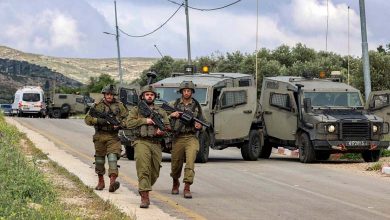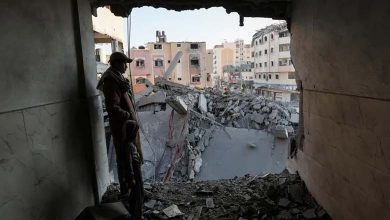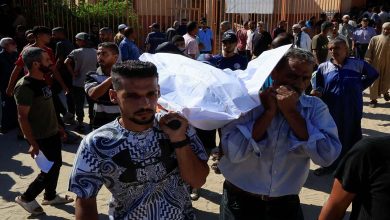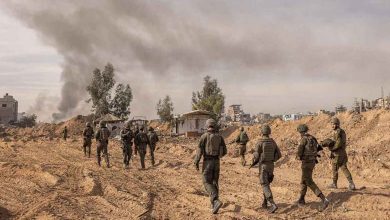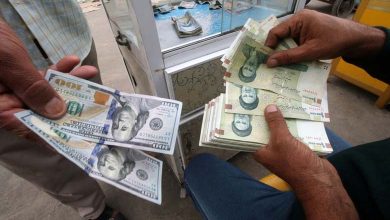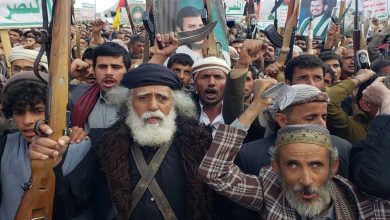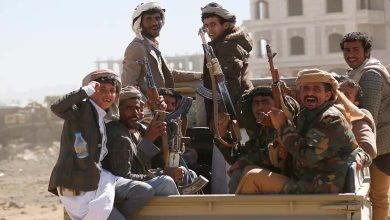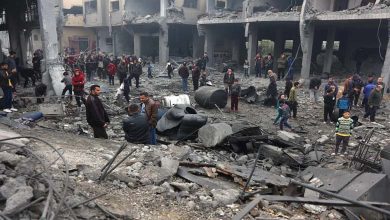France presents a proposal for de-escalation between Hezbollah and Israel
A French document calls on fighters, including Hezbollah's elite unit, to withdraw 10 kilometers from the border
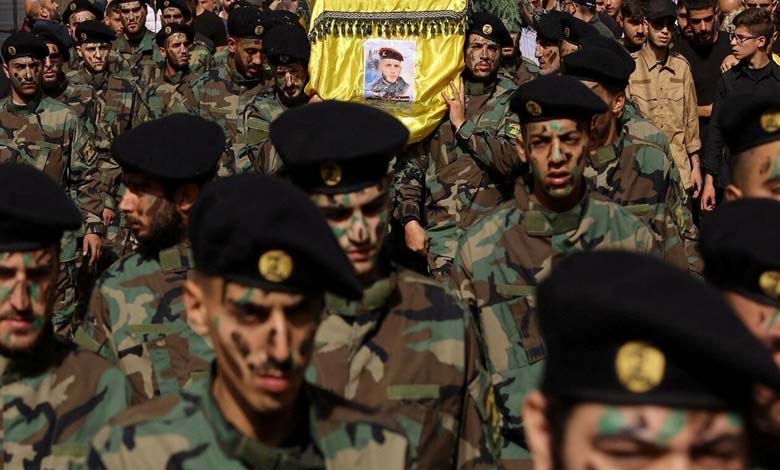
France has presented a written proposal to Beirut aimed at ending hostilities with Israel and reaching a settlement regarding the disputed borders between Lebanon and Israel, according to a document urging fighters, including Hezbollah‘s elite unit, to withdraw 10 kilometers from the border.
The plan aims to end the fighting between the Hezbollah group, allied with Iran, and Israel across the border. The mutual shelling is happening alongside the war in the Gaza Strip, raising fears of a destructive and comprehensive confrontation.
Four senior Lebanese officials and three French officials said that French Foreign Minister Jean-Yves Le Drian delivered the document last week to senior Lebanese officials, including caretaker Prime Minister Najib Mikati. This is the first written proposal submitted to Beirut during ongoing Western mediation efforts in recent weeks.
The proposal states that the goal is to prevent a conflict “threatening to escalate out of control” and to impose a “potential ceasefire, when conditions are right,” ultimately envisioning negotiations on demarcating the disputed land borders between Lebanon and Israel.
Hezbollah officially refuses to negotiate a ceasefire before the end of the war in Gaza, a position reiterated by one politician in the group in response to inquiries for this story.
In recent weeks, there has been speculation about similar mediation efforts by US Middle East envoy Amos Hochstein, but there have been no reports yet on the full details of the French written proposal delivered to Lebanon.
The three-step plan seeks a 10-day ceasefire period ending with negotiations on the borders. A French diplomatic source said the proposal was presented to the governments of Israel and Lebanon, as well as to Hezbollah.
France has historical ties with Lebanon and has around 20,000 citizens in the country and about 800 soldiers in the UN peacekeeping force.
Le Drian said at a press conference yesterday, “We have made proposals. We are in contact with the Americans, and it is important that we gather all initiatives and build peace.”
The plan proposes that Lebanese and Israeli armed groups cease military operations against each other, including Israeli airstrikes in Lebanon.
Several non-state groups, including Palestinian factions, have launched attacks on Israel from southern Lebanon during the latest round of gunfire exchanges, but Hezbollah is the dominant force in the area and has a fighting force widely seen as surpassing that of the Lebanese army.
The document suggests that all Lebanese armed groups demolish buildings and facilities near the border and withdraw combat forces, including fighters from the elite Rizwan Force, a Hezbollah unit, as well as military capabilities like anti-tank systems, at least 10 kilometers north of the border.
Such a withdrawal still leaves Hezbollah fighters much closer to the border compared to a withdrawal of 30 kilometers to the Litani River in Lebanon, as mandated by a UN resolution that ended the war with Israel in 2006.
A Western diplomat familiar with the written proposal, contained in two pages, said that the shorter withdrawal would help ensure that rockets do not reach villages in northern Israel that have been targeted by anti-tank missiles, and it represents a more acceptable compromise for Hezbollah than pulling back to the Litani River.
The proposal also calls for the deployment of up to 15,000 Lebanese army troops in the southern Lebanon border area, a political stronghold for Hezbollah where group fighters have long been integrated into the community during times of calm.
In response to a question about the proposal, prominent Hezbollah politician and deputy Hassan Fadlallah said that the group would not discuss “any matter related to the situation in the south before the aggression on Gaza stops,” adding that “the enemy is not in a position to impose conditions,” and refrained from commenting on the details of the proposal or whether Hezbollah had received it.
One Lebanese official said that the document encapsulates ideas discussed in talks with Western envoys and was conveyed to Hezbollah. He added that French officials informed the Lebanese that it is not a final paper, after Beirut objected to parts of it. An Israeli official said that the government received the proposal and is discussing it.
Last month, it was reported that Hezbollah rejected ideas proposed by Hochstein, who was leading the efforts, but also left the door open to diplomacy.
In response to a request for comment for this story, a spokesperson for the US State Department said the United States “continues to explore all diplomatic options with our Israeli and Lebanese counterparts to restore calm and avoid escalation.” The White House did not immediately respond to a request for comment.
The Lebanese official said that several elements raised concern in Beirut, such as armed groups demanding the demolition of buildings and facilities near the border, which the official indicated were vaguely worded and could be used to call for action against Hezbollah-affiliated civilian institutions. Tens of thousands have fled their homes on both sides of the border since the gunfire exchange began on October 8th.
Israeli strikes have killed nearly 200 people in Lebanon, 170 of them Hezbollah fighters. Attacks from Lebanon have killed 10 soldiers and five civilians in Israel.
However, the gunfire has mostly been confined to areas near the border, and both sides say they want to avoid a full-scale war.
A large number of Western envoys have visited Beirut to discuss ways of calming tensions, with most meeting with state officials rather than Hezbollah, which the United States classifies as a terrorist organization.
One Lebanese official said that a French technical delegation returned to Beirut two days after Le Drian’s visit to discuss details, following Lebanese objections.
Another Lebanese official said that Beirut did not respond to the proposal, adding that it was not signed or dated, and therefore not officially considered enough to warrant a response.
The proposal recalls the ceasefire that ended a war between Hezbollah and Israel in 1996, as well as UN Security Council Resolution 1701 that ended the 2006 war.
It outlines three steps to be taken over 10 days. The first step halts military operations by both sides. Within three days, the second step requires Lebanese armed groups to withdraw their fighters at least 10 kilometers north of the border, and Lebanon begins deploying troops in the south. Israel stops flying over Lebanese territory.
As for the third step, within ten days, Lebanon and Israel resume negotiations on demarcating the land borders “gradually” with support from the United Nations Interim Force in Lebanon (UNIFIL).
They will also negotiate a roadmap to ensure the establishment of an area free of any non-state armed groups between the borders and the Litani River.
Earlier, Hezbollah indicated that it might support the state in negotiating an agreement with Israel to settle the status of disputed areas on the border in favor of Lebanon.
Issues requiring addressing include financing the Lebanese army, severely weakened by the country’s acute financial crisis.
The proposal calls for international efforts to support the deployment of the Lebanese army “with funding, equipment, and training.” It also calls for “social and economic development in southern Lebanon.”


